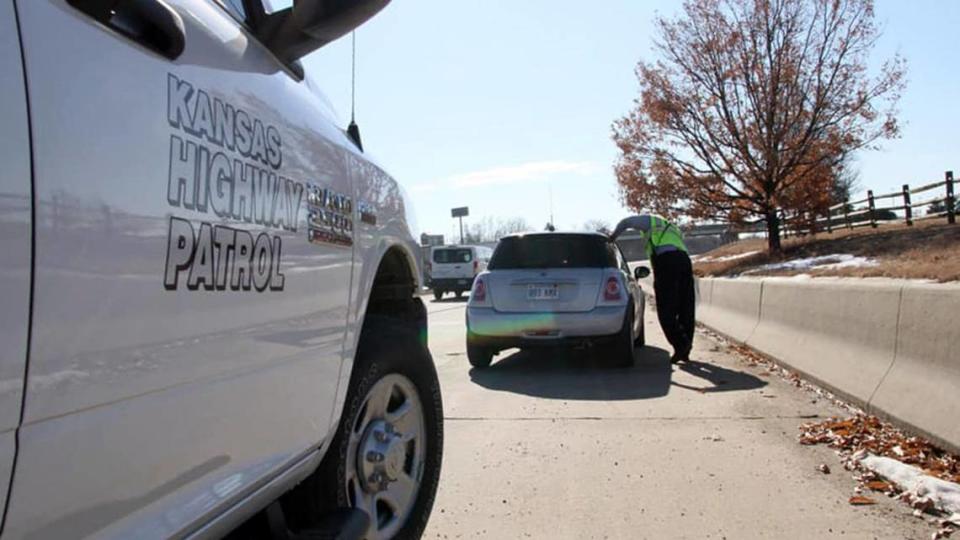Judge rules Kansas Highway Patrol ‘waged war on motorists,’ violated constitutional rights
The Kansas Highway Patrol “has waged war on motorists,” a federal judge wrote in a scathing ruling against the agency’s practice of extending car stops in hopes of discovering drugs.
In the order filed Friday, U.S. District Judge Kathryn H. Vratil wrote that patrol’s tactics in traffic stops violated the Constitution.
The practice, called the “Kansas two step,” is a maneuver in which troopers at the end of a traffic stop take a couple of steps toward their patrol car before turning around to initiate a voluntary interaction with the driver.
The strategy would buy the patrol extra time to probe for incriminating information or get a drug-sniffing dog to a location.
“As wars go, this one is relatively easy,” Vratil wrote. “It’s simple and cheap, and for motorists, it’s not a fair fight. The war is basically a question of numbers: stop enough cars and you’re bound to discover drugs. And what’s the harm if a few constitutional rights are trampled along the way?”
The Kansas Highway Patrol did not immediately respond to The Star’s request for comment.
In 2019, the American Civil Liberties Union sued the patrol on behalf of several individuals who were subjected to the “two step” strategy.
Sharon Brett, legal director for the ACLU of Kansas, called the ruling a “huge win” for those driving on Kansas’ highways.
“Today’s decision validates that motorists’ constitutional rights cannot be cast aside under the guise of a ‘war on drugs’. It also demonstrates that courts will not tolerate the cowboy mentality of policing that subjects our citizens to conditions of humiliation, degradation, and, in some tragic cases, violence,” Brett said in a statement.
The ACLU had argued the “two step” violated drivers’ constitutional rights protecting them from unreasonable search and seizure and alleged. They argued the tactic was used to target drivers coming from or heading to states where marijuana is legal, despite previous court rulings limiting how police can use information about a vehicle’s origin and destination.
Kansas is one of just three states with no form of legal marijuana or THC. Possession of the drug remains a Class B misdemeanor even as the state is surrounded on three sides by states that either allow recreational marijuana or have an extensive medicinal program.
“As a result, all drivers on I-70 have moving targets on their backs,” Vratil said, adding that troopers targeted out-of-state drivers and subjected them to a disproportionate number of searches based on where they were traveling to or from.
She also concluded that a few seconds of disengagement was not sufficient “for reasonable drivers to feel free to leave.”
Earlier this year two juries found that individual troopers employing the strategy had violated constitutional rights. This is the first ruling to hold the agency itself, specifically former Superintendent Herman Jones, culpable for the practice.
Testifying in this case in May, Jones said the two troopers who were found to have violated rates had not yet faced discipline. He could not recall whether the trooper’s supervisors had been disciplined.
He said at the time that troopers had no incentive to illegally search vehicles.
Jones retired from the patrol last month after a tenure marked by allegations of sexual harassment and gender discrimination. This week, a federal judge ruled in favor of Jones in a sexual harassment lawsuit brought by several current and former female employees. While the judge did not rule on the allegations themselves she said Jones had qualified immunity and that the allegations against him were not severe enough to merit legal action.
Democratic Gov. Laura Kelly appointed Erik Smith, a former top official at the U.S. Drug Enforcement Administration, to take over for Jones leading the agency. The Kansas state Senate will vote on his confirmation next year.
The lawsuit’s parties have until Aug. 14 to respond to the terms of a possible injunction. The injunction would require troopers to document all stops, detentions and searches. That report would require troopers to include information about the duration of the stop and how it concluded.
Troopers would also have to notify and get approval from a supervisor for consensual searches and let the driver know they can revoke consent at any time. Troopers would have to undergo 24 hours of annual training on investigatory stops. The injunction would remain in effect for four years unless KHP met the requirements sooner.
The Star’s Jonathan Shorman contributed to this report.


